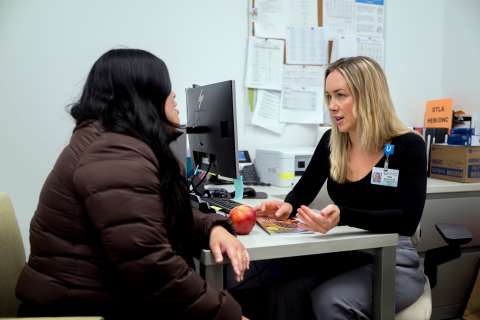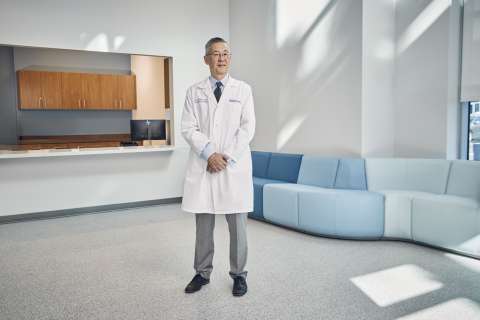Izak Ben-Meir likes to say he’s been “lucky in his unluckiness.”
And while that may seem like a dichotomy, his experiences during his 13-year journey with multiple myeloma – including access to world-class medical care and support services at UCLA Health and discovering his gift to uplift himself and others through his poetry, particularly haikus – bear this out.
Ben-Meir, 69, was born in Israel and emigrated to the U.S. as a child. He graduated from USC with an MFA in film production and spent most of his career working as a sound recordist and videographer, primarily for network news shows including “60 Minutes” and “Today.” He is also an Oscar-nominated documentary filmmaker.
Ben-Meir was 56 when he was diagnosed with multiple myeloma, a cancer of the blood plasma cells found in the bone marrow.
“Tick…tock…asks the clock.
How much time do I still have
To dance on this earth?”
Difficult to detect
About 36,000 new cases of multiple myeloma will be diagnosed in 2024, according to the American Cancer Society. The disease is slightly more common in men than in women, and the average age of diagnosis is 69.
Ben-Meir’s cancer was discovered after he started having back pain. He was first checked for kidney stones, arthritis and several other conditions. It was during a massage that a physical therapist noticed something unusual with his back. His doctor ordered an X-ray, which showed that Ben-Meir had a compression fracture from two vertebrae rubbing against each other.
As he hadn’t suffered an accident or a fall, the question became why. Several tests later, a myeloma diagnosis was confirmed.
The bone marrow naturally creates new bones while the older bones deteriorate, but myeloma interferes with the process. This can cause bone fractures for no apparent reason.
A genetic analysis of Ben-Meir’s myeloma showed that he additionally had P17 and P53 chromosomal abnormalities. This indicated he was high risk for progression of the disease and consequently would need more intense and frequent therapies.
He recalls the initial shock of having cancer was terrifying: “It’s like the ground opens up and you’re staring at your own mortality, floating around in a spaceship and looking at yourself and wondering what’s going on,” Ben-Meir says. “But after a few months, you gain strategies to adjust.”
“My veins filled with angst
Young birds learn to soar on high
Will they fly or die?”
Learning acceptance
After his diagnosis, Ben-Meir found out as much as he could about myeloma, including that there are many treatments for the disease, but no cure.
“I was told, well, you have this high-risk disease, and what that means is that you will be successfully treated but myeloma always comes back,” he says.
Ben-Meir was very engaged in his treatments and chose UCLA Health’s Gary Schiller, MD, a member of the UCLA Health Jonsson Comprehensive Cancer Center, as his physician. Dr. Schiller is a professor of hematology/oncology at the David Geffen School of Medicine at UCLA and director of the hematological malignancies/stem cell transplantation unit.
Within eight months, Ben-Meir had a successful stem cell transplant at UCLA Health. The procedure, along with ongoing maintenance chemotherapy, bought him seven years of complete remission, even though the expectation was for a relapse much sooner.
“Again, I was lucky. I didn’t have too many side effects,” he says. “And for a while there, I felt I had licked this thing.”
But ultimately the cancer returned.
“I had grown to accept cancer, and adjust to its challenges, as part of my life,” Ben-Meir recalls. “I was still working, everything was fine. And so when I had a relapse, it really set me back.”
“Abandoned lighthouse
Gone its stature and purpose
I too lost my way.”
Accessing support
To date, Ben-Meir has had four treatments for his myeloma, including a recent CAR T-cell transplant. While he credits each of those for prolonging his life, the healing effects of receiving holistic care and support as a patient at the Simms/Mann UCLA Center for Integrative Oncology have been invaluable, he says.
Ben-Meir refers to himself as “the poster child for Simms/Mann.” Through the center’s integrative approach, he has been able to process his feelings and his fears.
“I took advantage of anything and everything that I could get my hands on,” he says, including individual counseling, nutritional consults, informative webinars, meditation, spiritual groups and qigong, an ancient Chinese mind-body exercise form that uses meditation, breathing and movement.
“Brilliant light shines in
Through the crack that’s created
When we are damaged.”
One of the groups he has attended weekly since he began treatment is mindful meditation. Ben-Meir says the sessions have given him a deeper, more satisfying quality of life and the ability to live in the moment.
“And in that way, we prolong our lives,” he explains. “What good is it to live longer if your life is empty, meaningless, and constantly filled with anxiety and trauma? And so you can extend your life in that sense, too, by giving it depth and meaning at every moment.”
Will these approaches affect his longevity? Maybe not, Ben-Meir notes. But they empower him.
“Being a cancer victim, you feel victimized. Like, I’m a good person – why did this happen to me?” he says. “But by engaging in all these things, it empowers you because it affects your life, the quality of your life, and you feel like you’re doing something to improve your life.”
Finding creative space
Living with cancer can be overwhelming for anyone, he says. One of the ways he has found to overcome feelings of fear and anxiety is through writing, especially haiku – a short form of poetry that is limited to 13 syllables in a five-seven-five-word pattern.
Why haiku? Ben-Meir says he appreciates the short structure that focuses him, by forcing him to process and express his feelings in a limited space.

“Sometimes we have to learn to work within our limitations,” he explains. “A kite cannot fly unless it's restricted by the string, the line. Otherwise, it won't go anywhere. A bird cannot fly unless it has the resistance of the air. … So to learn to discipline ourselves, to work within and against the limitations that we have, sometimes generates a creative space.”
Ben-Meir often reads his haiku, as well as his surrealistic essays, for his groups at the Simms/Mann Center.
“I’m very grateful that they allow me to do that,” he says. “I feel a lot of the things I write resonate to other people’s concerns, and so I’m happy I’m able to do that. It both validates their experiences as well as giving them some perspective, and perhaps a smile.”
“Grass tickles my toes,
Praying mantis laughs at me,
Renewing my soul.”
Groundbreaking treatment
In January 2024, Ben-Meir received a CAR T-cell transplant at UCLA Santa Monica Medical Center. CAR T-cell therapy is a single-dose infusion that uses the body’s own white blood cells, which are genetically modified to add a chimeric antigen receptor (CAR) to the surface. When the modified T cells are reintroduced into the patient’s body, the receptor specifically recognizes, targets and destroys the myeloma cells.
Ben-Meir’s cancer has been in remission since the procedure and he is off all maintenance drugs for the first time in 12 years. “So, I’m like a new person,” he says.
He is grateful he was diagnosed during a time in which there have been significant developments in myeloma research and treatments, he says.
“I am also very grateful for the unbelievable care that I’ve received at UCLA Health and support services like the Simms/Mann Center," he says. "I’ve been able to engage in a lot of different things related to my cancer journey. So I have to say, I’ve been very, very lucky in my unluckiness.”





